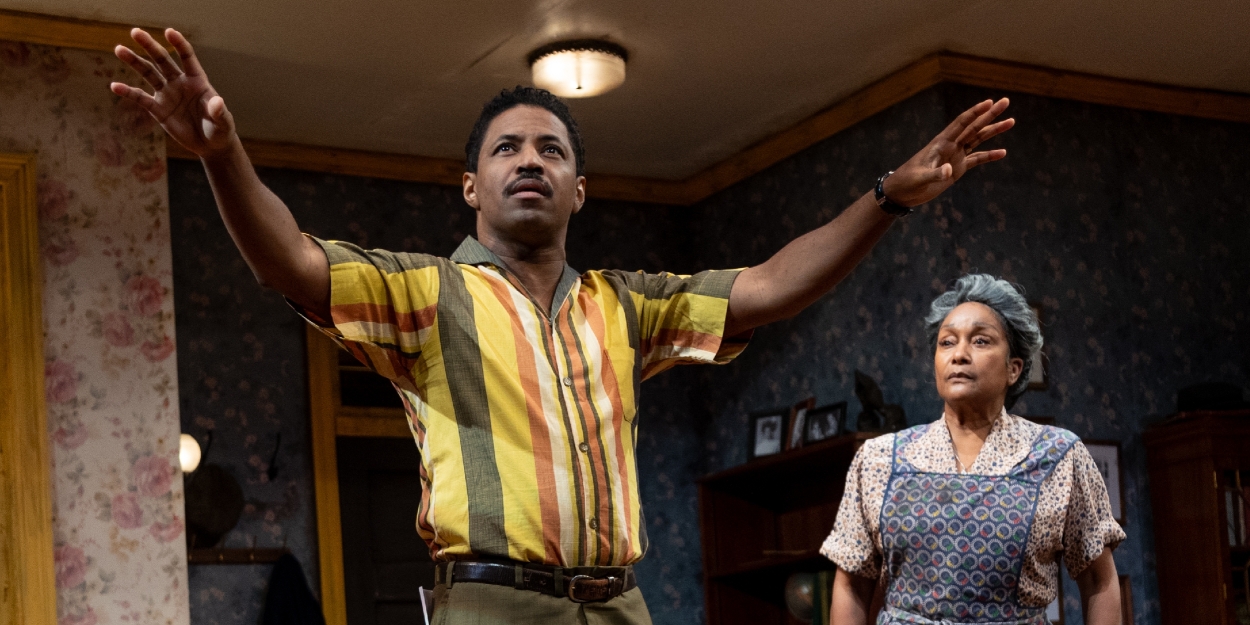Review: A RAISIN IN THE SUN at Theatrical Outfit
Perfection.

They're wrong about our beginnings. We are not born alone, we are born from mothers. And their mothers, and theirs. Sixty-five years later, A RAISIN IN THE SUN, written by Lorraine Hansberry (1930-1965), the first black, female playwright to have a play on Broadway, reveals universal truths about humanity that still ring out loud and clear today—love before money; pride, but not prejudice; and according to the Law of Conservation of Energy, all things come from that which cannot be destroyed—mothers.
Running through October 6th and expertly directed by Robert John Connor, Atlanta's Theatrical Outfit is currently showing a production of A RAISIN IN THE SUN that is nothing if not perfection. If you are reading this, especially as Americans and Atlantans, you have a responsibility for not only knowing this play, but experiencing this infamous story surely as Hansberry herself had imagined it. Plays are a medium intended to be seen and not only read. Theatrical Outfit has proven why. DO. NOT. MISS. THIS. PRODUCTION.
In the late 1930s, fraught with bias and political contamination, America's Federal Theatre Project (FTP) funded and formed some of 20th Century Broadway and Hollywood's most influential storytellers and American philosophers to this day. Possibly thumbing her thoughts at the typical great, white, male cannon as well as her lived experiences of racial inequity, segregation, and housing discrimination through an African-American, feminist lens, A RAISIN IN THE SUN does more than question the patriarchy for it's story-makers but also the stories themselves.
Hansberry's A RAISIN IN THE SUN summons Miller's DEATH OF A SALESMAN (1949), naming the villainous catalyst of her story, "Willy." One of Mama's infamous lines "...you don’t have to ride to work on the back of nobody’s streetcar," seems to finger William's A STREETCAR NAMED DESIRE (1947.) And even Beneatha's wealthy and prideful suitor named, "George," summons the Great American Codependent who's similar faith in a wad of lost cash crumbles an intimate empire while birthing renewed familial dependency in Capra's IT'S A WONDERFUL LIFE (1946.)
These faint echos of the FTP's early influences, are things I noticed, not because I read them nor studied Hansberry in a literary classroom, but because of the way the actor's at Theatrical Outfit held the words of A RAISIN IN THE SUN on their tongues. It felt like opera, like gospel, and it was the first time in a long time I forgot I was watching a play.
You know these characters. You are these people. This production sucks you right onto the sofa into their living room. You find yourself wanting mama's approval, Ruth's affection, and Beneatha's roasting all for yourself. Even names of people we never meet take up a comfortable space in the house. Jen Harper as Lena, the matriarch, and Amari Cheatom, as Walter, Jr., hold up a $10k insurance check in place of the deceased Walter, Sr. as if the patriarch himself, and not his ghost, were in the palm of their hands or reflected in the tears on their faces.
The cast is stunning, relishing every thought between every line and representing the past, present, and future of an entire culture not only from the epic material, but a sense they have been waiting to play these roles their whole lives. A singular glance from Ruth, played by the exceptional Cynthia D. Barker tells Hansberry's every word ever written. Nothing is wasted. The audiences involuntary murmurs, cheers, chuckles, and mid-scene applause makes the witnessing of Hansberry's timelessness even more eventful.
The cast and crew includes: Cynthia Barker, Marlon Andrew Burnley, Aleigha Burt, Amari Cheatom, Anthony Goolsby, Jen Harper, Doyle Reynolds, Stephen Ruffin, and introducing Shamar Hill. Scenic Design is by Moriah & Isabel Curley-Clay, Costume Design is Deondre’ Cumberbatch, Wig Design is Trey Giddens, Lighting Design is Mike Wood, Sound Design is Jeremiah Davidson, Properties Design is Leah Thomas, and Stage Manager Lisa Watson calls a solid heartbeat to the rhythmic performances.
As a mother, and a passionate, theatre lover, who revels in the ephemeral nature of the context of a perfectly timed performance...go see this Theatrical Outfit production NOW so you can say you "saw it when...where...who...how...why..."
Photo: Casey G. Ford
Reader Reviews
Videos

